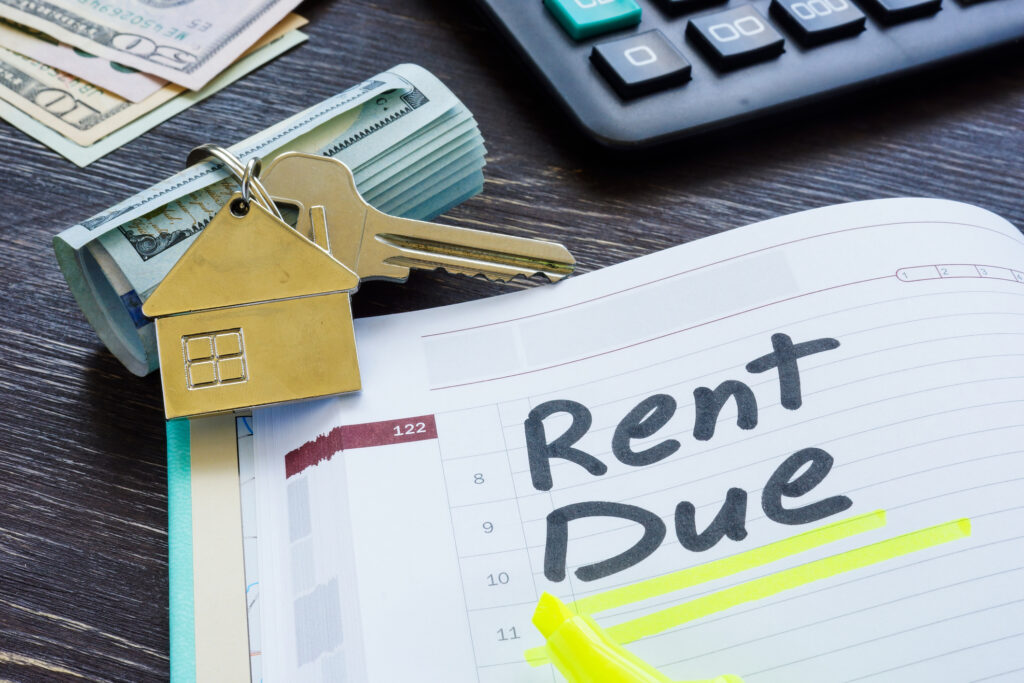For many, rent is the largest monthly expense – which is why being able to keep track of this financial obligation is extremely important. From understanding lease agreements to managing fluctuating rental markets, the journey to financial stability in the realm of apartment living can be daunting.
In this guide, we explore the components of paying apartment rent – offering insights, tips, and strategies to empower renters to navigate this aspect of their apartment experience. Whether you’re a seasoned renter or embarking on your first lease, join us as we unravel the complexities and illuminate the path towards financial security in the world of apartment living.
Your rent – what is it, really?
When discussing the concept of paying rent, it’s essential to understand that it encompasses more than just the base amount for occupying a space. Rent, depending on your situation, can have many components to the final dollar amount. Moreover, this is your payment for using someone’s personal property. So, it’s best not to be late or miss a payment!
- Base rent: This forms the foundation of your rental payment and refers to the agreed-upon amount you pay to your landlord or property management company for the right to occupy the space. The base rent typically depends on factors such as location, size, amenities, and market demand. This amount should be reflected on the first page of your lease.
- Amenities: Many rental properties offer amenities such as access to a gym, swimming pool, parking facilities, or communal spaces like a clubhouse or rooftop terrace. These amenities enhance the quality of life for tenants but may come at an additional cost, either included in the base rent or charged separately as amenity fees.
- Vehicle parking: If you require parking space for your vehicle, especially in urban areas where parking is scarce, your rental agreement may include a fee for a designated parking spot. This additional cost ensures convenience and security for your vehicle.
- Trash removal: Proper waste disposal is crucial for maintaining a clean and hygienic living environment. In many rental agreements, the cost of trash removal and recycling services is included in the overall rent payment. If it is not included in rent, you may see this listed as a refuse fee. Trash removal covers the regular collection and disposal of household waste.
- Utilities: Utilities refer to essential services such as electricity, water/sewer, gas, and internet access. Depending on the terms of your lease, you may be responsible for paying these utilities directly to the service providers or as part of your rent to the landlord. Alternatively, some rental properties offer all-inclusive rent, where utilities are bundled into the monthly payment for convenience.
- Pet fees: For tenants with furry companions, additional fees may apply. Many landlords charge pet rent and sometimes a one-time pet deposit to cover potential damages or cleaning costs associated with allowing pets on the premises. This fee can vary depending on factors such as the type and size of the pet, as well as local regulations. Pet fees ensure that both tenants and landlords are protected in case of any pet-related incidents during the lease term.
Understanding the breakdown of rental expenses beyond just the base rent is crucial for budgeting and financial planning as a tenant. By considering all components of your rent payment, you can better assess the overall affordability of a rental property and make informed decisions about your housing expenses.
How to pay your rent
In today’s digital age, there are a variety of ways to pay your rent. Just remember the importance of paying rent on time!
Personal Check
In the state of Connecticut, paying rent with a personal check remains a common and convenient method for tenants to fulfill their rental obligations. When submitting rent payments via personal check, tenants typically make them payable to their landlord or property management company. It’s crucial to ensure that the check is properly filled out, including the accurate amount and date. Tenants should also verify the recipient’s correct name and address to prevent any delays or errors in processing.
Electronic Checks (eChecks)
eChecks, or electronic checks, function similarly to traditional paper checks but are processed digitally. Tenants can initiate eCheck payments through various online platforms, including their bank’s website, mobile banking apps, or third-party payment services. Before opting for eCheck payments, tenants should confirm with their landlord or property manager regarding their preferred methods of rent payment and any associated procedures or requirements (typically stated in the lease). While electronic payment options offer convenience and efficiency, it’s essential for tenants to ensure the security and accuracy of their transactions when paying rent electronically.
Debit and Credit Cards
Paying rent with a debit or credit card provides tenants with a convenient and flexible alternative. Tenants can initiate rent payments using their debit or credit card through various mediums, including online payment portals, mobile apps, or over the phone. Landlords or property management companies may utilize secure payment processing platforms to handle card transactions, ensuring the safety of tenants’ financial information.
It’s essential for tenants to be aware of any potential fees associated with using a debit or credit card for rent payments, as some landlords or payment processors may charge convenience fees for card transactions. Additionally, tenants should confirm that they have sufficient funds available in their bank account or credit limit to cover the rent payment to avoid overdraft fees or declined transactions.
When is rent due?
Please use this link to understand Renter’s Rights in CT – The State of Connecticut’s Renter’s Rights.
Your rent due date will be written in the lease contract. Tenants who pay rent monthly have a 9-day grace period before the rent is considered late. For example if your rent is due on the 1st of each month, you must pay rent by the 10th of each month. In the circumstance you are a weekly renter, the deadline is by the 5th day of each week. If your rent is due each Sunday, then it is considered late if it is not paid by the following Thursday.
What if I am late?
The landlord can charge a fee for late rent, but only if it says written in your lease. You are only charged the smallest of the following fees:
- up to $5 per day the rent is late, but not more than $50 in any month.
- 5% of the amount of the overdue rent.
- if you get rental assistance, 5% of your share of the rent.
Landlords cannot charge more than one late fee for unpaid rent. Landlords are not allowed to offer a discount if you pay before the deadline.
Understanding the implications of late rent payments is crucial for tenants to adhere to their rental agreements responsibly. If a tenant fails to make a rent payment by the due date specified in the lease, the landlord has the right to impose a late fee as outlined in the lease agreement. However, the late fee charged must adhere to specific legal guidelines set forth by Connecticut state law.
If a tenant fails to make a rent payment and incurs a late fee, the landlord typically initiates a series of steps in response to the delinquency. These steps may include issuing a written notice to the tenant detailing the late payment and any associated fees, along with a reminder of the consequences of continued non-payment.
Depending on the severity of the delinquency and the terms outlined in the lease agreement, the landlord may also pursue legal action to recover the overdue rent or initiate eviction proceedings. It’s critical for tenants facing financial difficulties to communicate openly with their landlords and explore potential solutions, such as payment plans or assistance programs, to address the situation and avoid further complications.
How is rental pricing determined?
Rent prices are complex and ever-changing, with distinct differences in pricing methods between units in apartment complexes and single-family homes/townhomes.

Large apartment communities
Rent calculation for apartment complexes is often an intricate process driven by advanced software programs tailored to the specific needs of the property management company. These programs utilize a comprehensive algorithm that takes into account a multitude of factors to determine the optimal rent for each unit.
Key variables considered include: current market conditions, competitor rates in the surrounding area, and the community’s current occupancy levels. However, the complexity doesn’t end there. These programs go even deeper, factoring in unit-specific attributes such as size, square footage, and location within the community. Additionally, amenities and features such as upgraded appliances, premium flooring, or scenic views are meticulously weighed to assess their impact on the rental value.
By synthesizing this wealth of data, the software generates dynamic rental rates that reflect both market dynamics and the unique characteristics of each individual unit, ensuring competitive pricing while maximizing revenue for the apartment community. This sophisticated approach to rent calculation enables property managers to strike the delicate balance between attracting tenants and optimizing profitability in a dynamic and competitive rental market.
Single-family homes or townhomes
Rent calculation for single-family homes/townhomes typically revolves around analyzing comparable properties (comps) in the surrounding area. Property owners or landlords assess the rental market by researching recently rented properties with similar features, size, and location to their own. By comparing factors such as the number of bedrooms and bathrooms, square footage, amenities, and condition of the property, landlords can gauge the market demand and rental rates for their specific type of property.
Additionally, considerations may extend to factors like school districts, proximity to amenities, and overall neighborhood desirability. Once a comprehensive analysis of comparable properties is conducted, landlords can establish a competitive yet fair rental price that aligns with market trends while maximizing their property’s earning potential. This approach ensures that the rent reflects the property’s value in relation to similar homes in the area, optimizing the likelihood of attracting tenants and achieving a desirable rental income.
Will my rent increase?
In the world of apartment renting, one inevitable aspect that tenants often encounter is the possibility of rent increasing. Typically, tenants receive a renewal offer letter with these increases anywhere from 60 to 75 days before their lease ends, allowing ample time for consideration and planning. It’s common practice for landlords to require a 60-day notice if tenants intend to vacate the property, ensuring both parties have sufficient time to make arrangements. Upon receiving a renewal offer letter, tenants have options.
Tenants can choose to negotiate with their landlord if they’re unhappy with the proposed increase, seeking terms that align better with their budget and circumstances. Alternatively, if tenants are content with the proposed increase or choose not to negotiate, they can proceed with renewing their lease. However, if the rent increase is untenable or doesn’t align with their financial plans, tenants can provide written notice to vacate, initiating the process of finding alternative housing options. Being aware of these procedures and timelines empowers tenants to make informed decisions regarding their rental agreements and financial commitments.
Rent is due!
Understanding the components of your rent payment, from base rent to additional fees like utilities and pet charges, is crucial for financial planning. Knowing how to pay your rent, whether it’s through traditional methods like personal checks or modern options like online payments, ensures convenience and reliability. Ultimately, paying rent on time (if able) not only fosters a positive relationship with your landlord but also helps maintain your financial stability and peace of mind in the long run!

